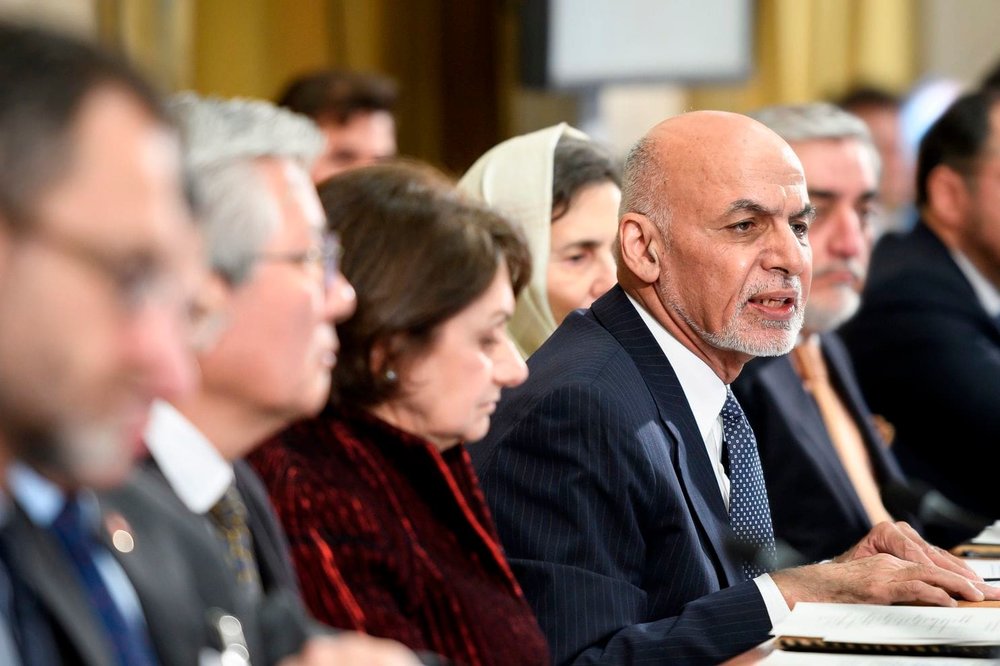At Geneva summit, Afghan government presents 'roadmap for peace and prosperity'

TEHRAN _ The much-awaited two-day Geneva conference on Afghanistan, co-hosted by the Afghan government and United Nations, was held this week, attended by delegations from 61 countries and 35 international organizations.
Afghan President Ashraf Ghani, who delivered a keynote address, made passionate appeal to the world community to see the war-torn country from the perspective of "investment" rather than "charity".
The conference was co-chaired by Afghan Foreign Minister Salahuddin Rabbani and Finance Minister Mohammad Humayon Qayoumi, and Special Representative of the UN Secretary-General, Tadamichi Yamamoto.
The conference, which came at a crucial time, after the parliamentary polls and before the presidential election, sought to measure progress made by the Afghan government in using billions of dollars in foreign aid for education, health care, infrastructure, and fighting corruption since the last donors conference in 2016.
According to a source, the participants noted with grave concern the deteriorating security situation with spate of terror attacks across the country in recent months. The delay in announcing the results of parliamentary polls and the possible delay in holding presidential election next year, source said, also came up for discussion.
Reaffirming its commitment to rebuilding and reconstruction efforts in the war-ravaged country, on day one of the conference, the European Union signed a financing agreement worth millions of euros, mainly focused on development and economy.
The 474 million euros ($535m) aid agreement is to support state building and public sector reforms, health, justice as well as tackling the issue of migration and displacement in the country.
"The EU stands side by side with Afghanistan and its people to build a stronger future for the country," Neven Mimica, commissioner for International Cooperation and Development, said at the summit. "Through joint efforts we intend to reduce aid-dependency and invest in democratic governance for the benefit all citizens of the country," she said.
Addressing the summit, Afghan leaders said the country is on the path to economic self-reliance and it won't be in need of foreign assistance in five years.
President Ghani laid down his government's road map for peace and prosperity and said a 12-member negotiating team has been formed to seek a peace agreement with the Taliban.
"We seek a peace agreement in which the Afghan Taliban would be included in a democratic and inclusive society," he told the audience.
But President Ghani warned that implementation of any peace deal will take at least five years.
Afghan Chief Executive Abdullah Abdullah said the peace process would have five phases starting with an intra-Afghan dialogue, followed by discussions with Pakistan and the United States, then regional actors, the Arab Islamic world, and finally NATO and non-NATO countries.
"The aim of each and every effort by our partners has to be to encourage the Taliban to come to the negotiating table with the Afghan government and put everything on the table," he said.
In his message, UN Secretary-General Antonio Guterres said there was a rare opportunity to move to direct peace talks between the Afghan government and the Taliban. "We must not miss it," Guterres said.
The European Union foreign affairs chief, Federica Mogherini, welcomed Afghan government's peace plan, saying, "It is time for concrete talks about peace to begin."
Iranian Foreign Minister Javad Zarif, who attended the conference, said all the countries need to facilitate the intra-Afghan dialogue. He also expressed concern over cross-border drug trade and presence of foreign military forces, which he said "has never brought stability in our region and has historically provided a recruiting ground for extremists."
In a joint communiqué, the conference participants agreed that peace in Afghanistan must be based on a broad political consensus across the society.
Participants welcomed the report of progress achieved by the government since the Brussels Conference of 2016, including on enhanced public financial management and streamlined national budgeting; reviewed remaining challenges; called for increased efforts to fight corruption and illicit narcotics, and promote peace, stability and the rule of law; and, adopted the Geneva Mutual Accountability Framework.
They also agreed to support policies strengthening national and subnational governance, regional economic cooperation and connectivity. Efficient and transparent monitoring and review of reform will further strengthen mutual accountability.
They agreed that holding parliamentary elections in October 2018 was an important step in the consolidation of democracy, much awaited by the population of Afghanistan. Presidential elections scheduled for April 2019 and future elections need to draw on the lessons learned in order to continually enhance the transparent, credible and participatory process to the benefit of all citizens.
Participants called on all concerned to seize this opportunity for an Afghan-owned and led peace process as the only viable path to satisfy the citizens’ desire for an end to conflict, sustained and broad-based economic growth, and a more prosperous tomorrow.
